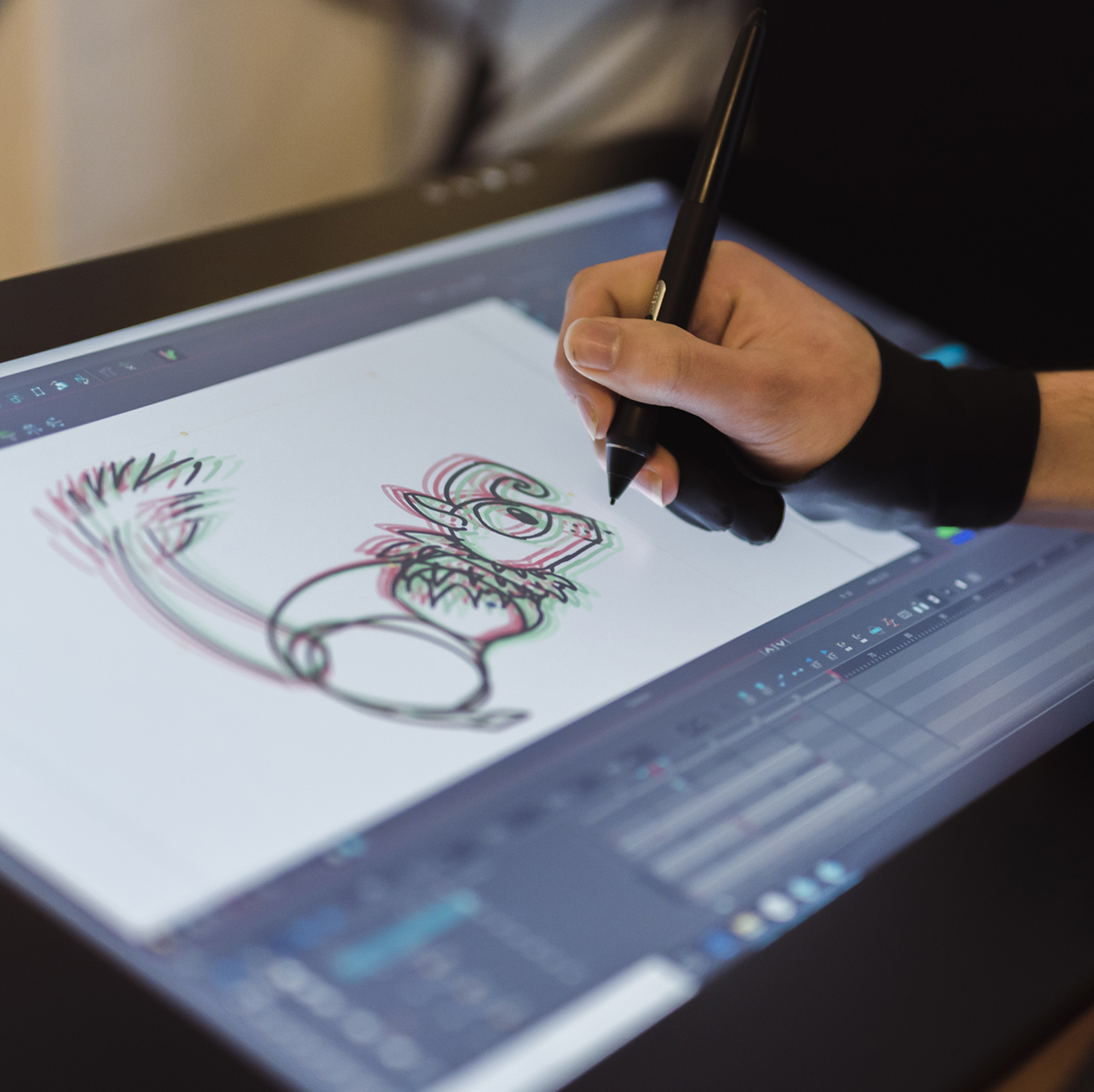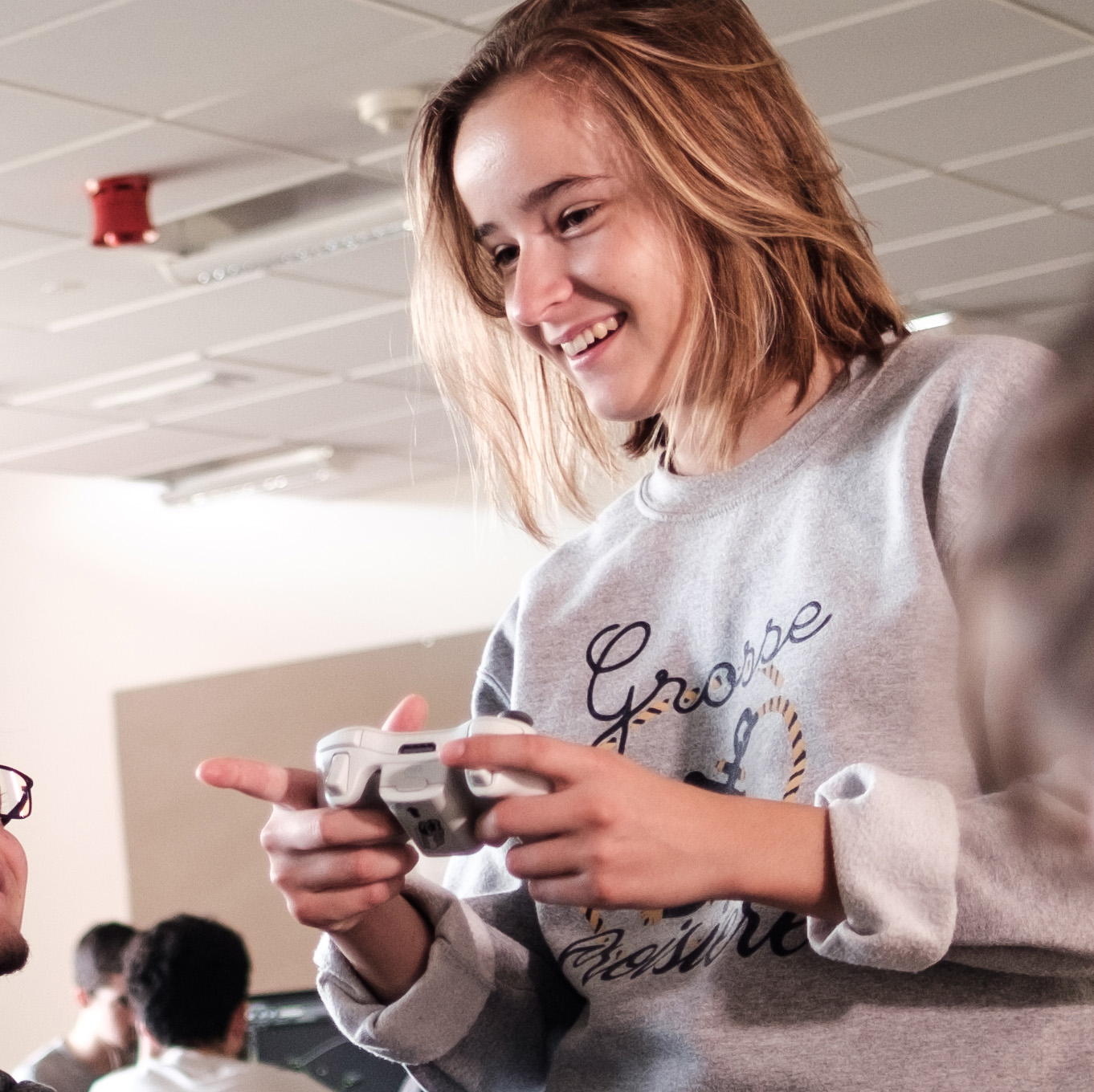BA (Hons) Game Art (with Foundation Year)

Course details
UCAS Code
305G
Year of entry
2024, 2025
Duration
4 YRS (FT)
UCAS Tariff
48-72
Institution Code
G53
Location
Wrexham
Why choose? this course?
This skill-based degree is ideal for those wishing to pursue a career in the game art and associated design industries. The degree explores all key aspects of game art production processes using a variety of techniques from 2D concepts to 3D production on screen. This includes 3D modelling, sculpting, level design and mixed screen-based media.
You will:
- Have the opportunity to collaborate with game developers and enterprise students
- Have access and utilise industry standard software and techniques, as well as working with Unreal Engine
- Be guided and supported by an award-winning team of lecturers on live projects
- Be given the chance to apply for funding, attend EGX trade fair, and enter competitions to showcase your portfolio.
- Gain experience in the design skills and techniques used to bring projects from concept to screen through digital painting, 3D modelling, 3D sculpting, 3D animation and game engine.
- Develop a mix of design and technical skills like environment/character design and creation, 3D modelling, texturing, level design, level creation, live briefs, and games production.
- Gain a sound knowledge of game and concept art, with an emphasis on innovation, design and creativity rather than the programming and technical aspects of the gaming industry.
- Use the latest industry-standard software.
- Have the opportunity to get hands-on work with industry professionals on real-world projects to help develop your skills and experience.
- *Study a course that is part of a subject area rated 3rd in the UK and 1st in Wales for satisfaction with teaching, and 2nd in the UK and 1st in Wales for satisfaction with the course in the Computer Science and Information Systems subject league tables, The Guardian University Guide 2022.
Key course features
Key Features
- Access to our purpose-built Centre for the Creative Industries building which features specialist facilities including game labs and studios equipped with a wide range of software such as Unreal Engine 5, Unity, Maya, Mudbox, Substance Painter/Designer, Visual Studio and Creative Cloud.
- Design and create aesthetically focused and game ready characters and environments with fully realised game products.
- Regular contact with game industry professionals through guest lectures, conferences, and national events.
- You will be taught by an award-winning teaching team with professional industry backgrounds and experience.
- Learn how to manage a professional game development team using industry-standard methodologies and practice.
- Work with the latest tools and technology in two specialist game development studios dedicated to designing, production, motion capture and VR.
- The course has an excellent track record for graduate employment with many ex-students going on to work at some of the world's most recognisable game studios.
- Gain valuable experience and insight into the game production process and the management of an independent game studio.
- Benefit from a personal mentor with games development experience to help develop your skills and knowledge.
- Support for indie company spin out through support, advise and potential funding through Games Talent Wales
- Develop your professional, communication, and entrepreneurial skills so that you are well equipped to enter a diverse and rapidly changing industry.
What you will study
This degree is primarily designed for those who want to pursue a career in the game art and associated design industries. It explores all key aspects of game art production processes, drawing upon your imagination and using a variety of techniques from 2D concepts to 3D production on screen, including 3D modelling, sculpting, level design and mixed screen-based media. Emphasis is placed on your personal and professional development, communication and entrepreneurial skills so that you are well equipped to enter a diverse and rapidly changing industry.
YEAR 1 (FOUNDATION YEAR)
The foundation year will introduce you to the key elements of art and design, including design practice, applied and fine art. You will explore the creative thought process relating to various art and design disciplines, developing your ability to put ideas down on paper quickly. There will be a range of practice assignments that will increase your recognition of strong ideas and original concepts.
YEAR 2 (LEVEL 4)
MODULES
- Game Design and Interaction
- Game Asset Production
- Game Environments and Narrative Design
- Character Design and Digital Sculpting
- Game Industry and Agile Production
- Design Workshop
YEAR 3 (LEVEL 5)
MODULES
- Asset Production for Game Engines
- Character Production for Game Engines
- Real-Time Environmental Art for Game Engines
- Serious Games Design
- Indie Studio Management
- Group Project
YEAR 4 (LEVEL 6)
MODULES
- Advanced Asset Production and Technical Art
- AAA Asset Production
- Advanced Game Design and User Engagement
- Game Industry Specialist
- Project
The information listed in this section is an overview of the academic content of the programme that will take the form of either core or option modules. Modules are designated as core or option in accordance with professional body requirements and internal academic framework review, so may be subject to change.
Entry requirements & applying
Our general entry requirement for the foundation year is 48-72 UCAS tariff points but all applications are considered individually and we consider work experience, vocational training/qualifications as well as motivation and potential to succeed.
The programme welcomes applications from anyone who can demonstrate a commitment to the subject and the potential to complete their chosen programme successfully. This can be established by showing appropriate academic achievements or by demonstrating that they possess the knowledge and ability equivalent to the academic qualifications.
Candidates may be interviewed and asked to display a portfolio of their work. Experience may also be taken into consideration depending on the extent and depth of such subject knowledge. Students from overseas, or who are unable to attend an interview, are asked to send their portfolio of work digitally for consideration.
Teaching & Assessment
This course is portfolio focused and as such, there are no formal exams. Students will focus on developing technical and theoretical skills via practical assignments and research & development activities.
Assessment methods include the production of digital (and non-digital) games, character and creature models and game environments, compiling, analysing production data, giving presentations and producing 3D models.
At higher levels of the course, students must also provide statistical evidence of work hours with supporting evidence as part of key assessment outcomes.
TEACHING AND LEARNING
On this course teaching and learning is designed to support students from a variety of backgrounds with diverse needs and to promote the supportive learning environment and pastoral care the School of Art and Design provides. Timetabling is developed to help learning, teaching and assessment methodologies and provide clear and effective feedback to students.
There is strong support for students with learning differences and who can also receive additional help from support assistants through Student Support Services.
The programme is structured to enable you to work in a multidisciplinary manner, to be flexible and enable you to develop individually. This is supported by a personal tutor/tutorials system that provides you with guidance throughout all aspects of the programme.
Wrexham University is committed to supporting our students to maximise their academic potential.
We offer workshops and support sessions in areas such as academic writing, effective note-making and preparing for assignments. Students can book appointments with academic skills tutors dedicated to helping deal with the practicalities of university work. Our student support section has more information on the help available.
In terms of particular needs, the University’s Inclusion Services can provide appropriate guidance and support should any students require reasonable adjustments to be made because of a recognised prevailing disability, medical condition, or specific learning difference.
Career prospects
Our Careers & Employability service is there to help you make decisions and plan the next steps towards a bright future. From finding work or further study to working out your interests, skills and aspirations, they can provide you with the expert information, advice and guidance you need.
Students completing this course may forge successful careers as 3D character artists, game and level designers, animators, and vehicle/weapons artists.
Our graduates are employed by some of the worlds most recognisable brands such as Ubisoft, Sony, Nintendo, Rockstar and Travellers Tales. We also work hard to support graduates who choose to set up their own games studios based within our innovative business incubation centre.
This course delivers practical skills in 3D modelling, digital sculpting, game design, environment art, and project management which will qualify you to work in a variety of roles within the industry.
Given the business and entrepreneurship skills acquired on the course, some graduates opt to start their own game studios with the support of our business incubation centre as part the Business Accelerator programme.
Fees & funding
You do not have to pay your tuition fees upfront.
The fees you pay and the support available will depend on a number of different factors. Full information can be found on our fees & finance pages. You will also find information about what your fees include in the fee FAQs.
All fees are subject to any changes in government policy, view our undergraduate fees.
Programme specification
Accommodation
If you’re looking for a place to stay while you study then take a look at our accommodation pages to get more information on your options, including our on-campus halls of residence Wrexham Village.

